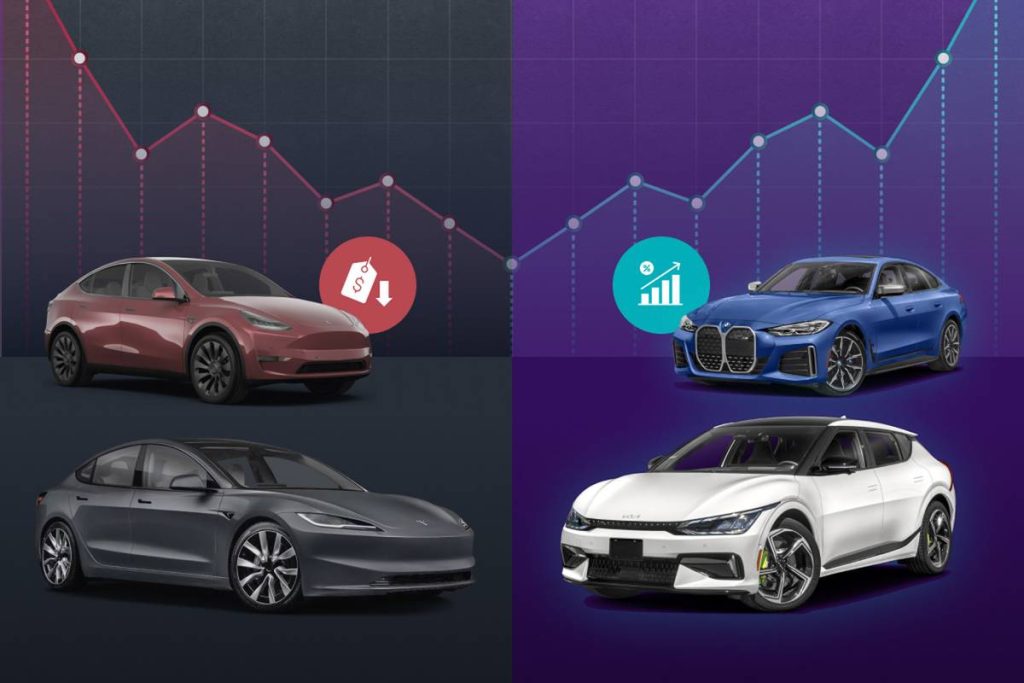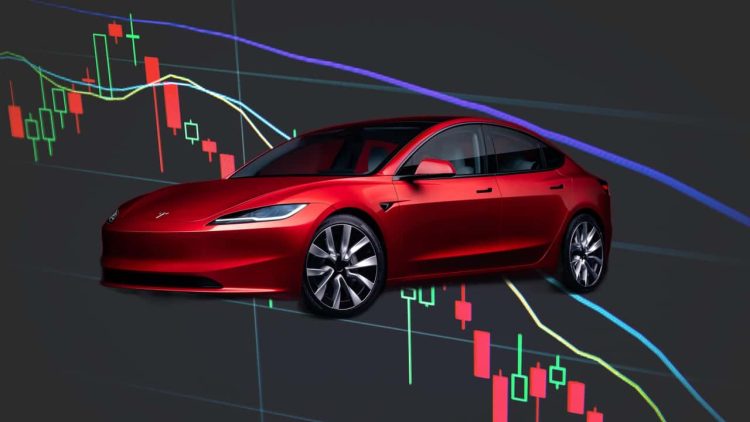Tesla’s meteoric rise has forced investors, analysts, and car enthusiasts alike to reconsider how we categorize the company. Is Tesla just an automaker, or has it transcended its role to become a bona fide tech company? To answer this, we need to delve into Tesla’s business model, its innovation in electric vehicles (EVs), its impact on the tech industry, and how these factors affect its valuation. Additionally, we will explore how investors should approach Tesla in light of these considerations, weighing the balance between its automotive roots and its technological innovations.
Tesla’s Origins: More Than Just Cars
At its core, Tesla was founded as an electric car manufacturer with the goal of revolutionizing the automotive industry. The company’s initial focus was on building electric vehicles that were not just eco-friendly but also high-performance and desirable. From the Roadster, which debuted in 2008, to the Model S, Model 3, Model X, and Model Y, Tesla quickly became synonymous with innovation in the electric vehicle market.
But Tesla is far from a typical car company. Its founder, Elon Musk, has always positioned the company as more than just a manufacturer of electric vehicles. Musk has frequently referenced Tesla’s role in accelerating the world’s transition to sustainable energy, with the company working not just on EVs but also energy storage (Powerwall, Powerpack) and solar products (Solar Roof). Musk’s vision extends far beyond the car; it encompasses the entire energy ecosystem, blending automotive innovation with renewable energy technology.
Tesla’s Technological Innovations: More Than Meets the Eye
While Tesla is primarily known for its vehicles, its real innovation lies in the technology that powers those vehicles. Tesla’s vehicles are, at their core, computers on wheels, and this has led many to classify the company as a tech firm rather than a traditional carmaker. Here are several reasons why Tesla’s technological innovations set it apart:
Autonomous Driving Technology
Tesla’s Autopilot and Full Self-Driving (FSD) features are arguably some of the company’s most revolutionary innovations. While other automakers have been slow to adopt autonomous driving technologies, Tesla has made significant strides in developing and rolling out its Autopilot system, which offers driver assistance features like lane-keeping, automatic braking, and adaptive cruise control. The company’s long-term goal is to achieve full autonomy, with vehicles that can drive themselves without human intervention.
Tesla’s advancements in self-driving technology are rooted in machine learning and artificial intelligence (AI). The company collects massive amounts of real-world driving data, which it uses to train its neural networks. Tesla’s AI-driven approach to autonomy is unlike that of traditional automakers, which rely more on radar and LIDAR sensors. This data-driven approach places Tesla firmly in the realm of cutting-edge tech companies.
Battery Technology and Energy Solutions
Tesla’s batteries are another example of its technological prowess. The company has not only revolutionized electric car battery technology but also created scalable energy storage solutions. Tesla’s Gigafactories are capable of producing millions of lithium-ion batteries, a key component in both EVs and energy storage products. The company’s innovation in battery technology has resulted in longer-lasting, higher-capacity batteries that improve vehicle range and performance.
Tesla is also working on energy solutions that go beyond just electric cars. The Tesla Powerwall, Powerpack, and Solar Roof are part of Musk’s vision for a sustainable energy future. The Powerwall, for example, stores solar energy for home use, making homes less reliant on the grid. Tesla’s energy products help address one of the key challenges in renewable energy: storage. Without effective storage solutions, renewable energy sources like solar and wind are often unreliable. Tesla’s ability to innovate in both automotive and energy sectors underscores its position as a technology company.
Over-the-Air Updates and Software Integration
Unlike traditional carmakers, Tesla’s vehicles receive regular software updates over the air (OTA). This means that Tesla owners are not limited to the features and performance they purchased when they first bought their car. Instead, Tesla can improve the performance of its vehicles, fix bugs, and roll out new features without requiring a trip to the dealership. This software-centric approach is akin to the tech industry, where products like smartphones and laptops are constantly updated to enhance functionality.
Tesla also integrates software deeply into its vehicles, from the user interface to the management of battery systems and autonomous driving features. The company’s ability to push regular updates and continuously improve its products through software is a hallmark of a tech-driven company, rather than a traditional automaker.

Tesla’s Market Valuation: Tech or Auto?
When it comes to valuation, Tesla is often compared to tech companies rather than traditional automakers. The company’s market capitalization has frequently eclipsed that of major legacy automakers like General Motors, Ford, and Toyota. This has raised questions: Is Tesla overvalued as a car company, or is it priced appropriately as a technology innovator?
Auto vs. Tech Valuations
The valuation discrepancy between Tesla and traditional automakers can be attributed to the difference in market expectations. The traditional auto industry is valued based on a relatively stable, low-growth model. Automakers produce vehicles, and their profits are tied to car sales, which are often cyclical and dependent on consumer demand, financing, and global economic conditions. Traditional automakers also face significant regulatory pressure and face high costs related to production and R&D.
Tesla, on the other hand, is often valued as a high-growth tech company. Investors are betting not just on Tesla’s current vehicle sales but also on its future growth potential in areas like autonomous driving, AI, and energy storage. Tesla’s stock price reflects the market’s belief that the company is not merely an automaker but a leader in transforming multiple industries, from transportation to energy. Its ability to innovate and disrupt traditional industries places it in the same conversation as other tech giants like Apple, Amazon, and Google.
This high-growth, tech-like valuation model is evident in Tesla’s price-to-earnings (P/E) ratio, which is far higher than that of traditional carmakers. In contrast, companies like Ford and General Motors have relatively low P/E ratios, reflecting the slow, steady growth typical of the auto industry. Tesla’s P/E ratio, on the other hand, is often compared to those of high-growth tech companies, indicating that investors are valuing the company based on its future potential rather than its current profits.
Market Expectations for Growth
A significant portion of Tesla’s valuation is based on the expectation that the company will continue to dominate the EV market and expand into other high-growth areas, including AI and energy storage. Investors believe that Tesla is uniquely positioned to capitalize on the global shift to electric vehicles, as well as the growth of autonomous driving and renewable energy.
Tesla’s growth prospects have been further bolstered by the company’s ability to scale production and lower costs. With the launch of the Model 3 and Model Y, Tesla has been able to tap into a more mass-market audience, which has significantly expanded its customer base. This growth in production capacity, along with Tesla’s global expansion, has convinced investors that the company is capable of becoming a dominant player in the global automotive and energy markets.
Investment Strategies for EV Exposure
Investors seeking exposure to the EV sector have several options, and Tesla is often the first name that comes to mind. However, given Tesla’s high valuation and competitive pressures, investors may want to consider alternative strategies for gaining EV exposure.
Buying Tesla: The High-Risk, High-Reward Play
Investing in Tesla directly offers exposure to the company’s innovative technologies, but it also comes with significant risks. Tesla’s stock is highly volatile, and its valuation may not be sustainable if the company fails to meet growth expectations. While Tesla has been able to meet or exceed market expectations in the past, the company’s future is not guaranteed. Investors should be prepared for volatility and understand the risks involved in holding Tesla stock.
Diversifying in the EV and Tech Sectors
For investors who want exposure to the EV market without placing all their bets on Tesla, diversifying into other EV-focused stocks is a viable strategy. Companies like Rivian, Lucid Motors, and NIO are emerging players in the electric vehicle space and offer growth potential. Additionally, investors can look to companies involved in the EV supply chain, such as battery makers like CATL and LG Chem, or charging infrastructure providers like ChargePoint.
Tech Stocks with EV Exposure
Another strategy is to invest in tech companies that have a stake in the EV revolution. For example, companies like Apple, Google, and Amazon are making investments in autonomous driving, AI, and energy storage—areas where Tesla is also heavily involved. These companies may not be EV makers, but they are increasingly becoming part of the larger ecosystem of technologies that support electric vehicles and autonomous driving.
Conclusion: Tesla’s Dual Identity
Tesla is a company that defies easy categorization. While it started as an electric vehicle manufacturer, its technological innovations in AI, battery technology, and renewable energy have propelled it into the realm of tech companies. Tesla’s market valuation reflects the company’s potential to disrupt multiple industries, from automotive to energy, and investors are betting on the company’s ability to lead the next wave of technological advancement.
For investors, the key question is whether Tesla’s valuation accurately reflects its future growth potential or if the stock is overpriced relative to its actual earnings. With competition intensifying in the EV space and technological innovations continually reshaping the market, Tesla’s journey is far from over. Whether Tesla remains a dominant force in the tech and auto industries or faces challenges that slow its growth remains to be seen.












































